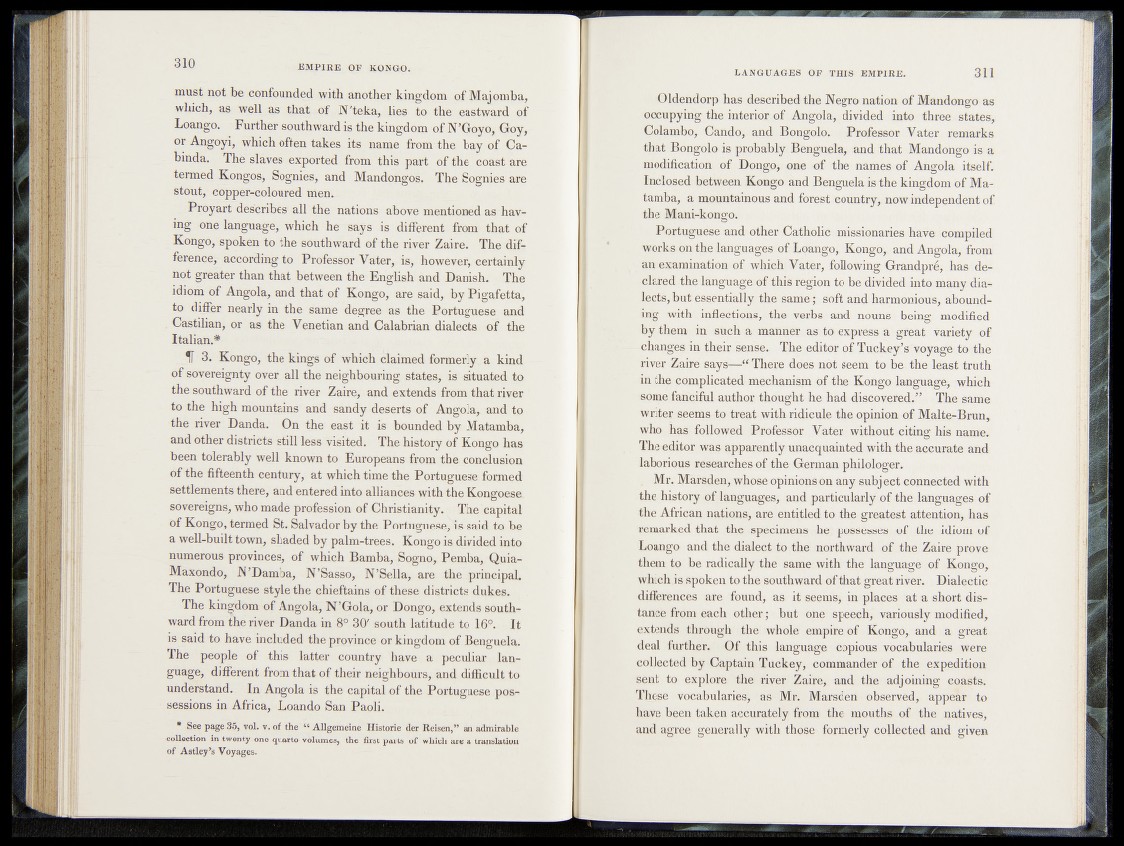
must not be confounded with Another kingdom of Majomba,
which, as well as that of N’teka, lies to the eastward of
Loango. Further southward is the kingdom of N’Goyo, Goy,
or Angoyi, which often takes its name from the bay of Cabinda.
The slaves exported from this part of the coast are
termed Kongos, Sogmes, and Mandongos. The Sognies are
stout, copper-coloured men_
Proyart describes all the nations above mentioned as having
one language, which he says is different from that of
Kongo, spoken to the southward of the river Zaire. The difference^
according to Professor Vater, is, however, certainly
not greater than that between the English and Banish. The
idiom of Angola, and that of Kongo, are said, by Pigafetta,
to differ nearly in the same degree as the Portuguese and
Castilian, or as the Venetian and Calabrian dialects of the
Italian.*
If 3. Kongo, the kings of which claimed formerly, a kind
of sovereignty over all the neighbouring states, is situated to
the southward of the river Zaire, and extends from that river
to the high mountains and sandy deserts of Angola, and to
the river Banda. On the east it is bounded by Matamha,
and other districts still less visited. The history of Kongo has
been tolerably well known to Europeans from the contusion
of the fifteenth century, at which time the Portuguese formed
settlements there, and entered into alliances with the Kongoese
sovereigns, who made profession of Christianity. The capital
of Kongo, termed St. Salvador by the Portuguese, is said to be
a well-built town, shaded by palm-trees. Kongo is divided into
numerous provinces, of which Bamba, Sogno, Pemba, Quia-
Maxondo, N’Bamba, N’Sasso, N’Sella, are the ..principal.
The Portuguese style the chieftains of these districts dukes.
The kingdom of Angola, N ’Gola, or Bongo, extends southward
from the river Banda in 8° 30' south latitude to 16°. It
is said to have included the province or kingdom of Benguela.
The people of this latter country have a peculiar lan-
guage, different from that of their neighbours, and difficult to
understand. In Angola is the capital of the Portuguese possessions
in Africa, Loando San Paoli.
* See page 35, vol. v. of the “ Allgemeine Historie der Reisen,” an admirable
collection in twenty-one quarto volumes, the first parts of which are a translation
of Astley’s Voyages.
Oldendorp has described the Negro nation of Mandongo as
occupying the interior of Angola, divided into three states,
Colambo, Cando, and Bongolo. Professor Vater remarks
that Bongolo is probably Benguela, and that Mandongo is a
modification of Bongo, one of the names of Angola itself.
Inclosed between Kongo and Benguela is the kingdom of Ma-
tamba, a mountainous and forest country, now independent of
the Mani-kongo.
Portuguese and other Catholic missionaries have compiled
works on the languages of Loango, Kongo,. and Angola, from
an examination ©f which Vater, following Grandpré, has declared
the language of this region to be divided into many dialects,
but essentially the same; soft and harmonious, abounding
with inflections, the verbs and nouns being* modified
by them in such a manner as td express a gfieat variety of
-changes in their sense. The editor of Tuckey’s voyage to the
rifcf Zjaire says—“ There does not Seem to be. the least truth
in the complicated mechanism of the Kongo language, which
some fanciful author thought he had discovered.” The same
writer seems to treat with ridicule the opinion of Malte-Brun,
who has followed Professor Vater without citing his name.
The editor was apparently unacquainted with the accurate and
laborious researches of the German philologer.
. Mr. Marsden, whose opinions on any subj ect connected with
the history of languages, and particularly of the languages of
the African nations, are entitled to the greatest attention, has
remarked that the specimens he,; possesses of the idiom of
Loango and the dialect to the northward of the Zaire prove
them to be radically the same with the language of Kongo,
which is spoken to the southward of that great river. Bialectic
differences are found, as it seems, in places at a short distance
from each other; but one speech, variously modified,
extends through the whole empire of Kongo, and a great
deal further. Of this language copious vocabularies were
collected by Captain Tuckey, commander of the expedition
sent to explore the river Zaire, and the adjoining coasts.
These vocabularies, as Mr. Marsden observed, appear to
have been taken accurately from the mouths of the natives,
and agree generally with those* formerly collected and given